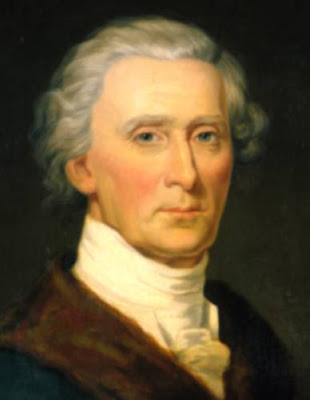This Worth Revisiting post was first published July 4th, 2015. Monday of this week was the 240th anniversary of the signing of the Declaration of Independence, which grounds the founding of the Unites States in a theological argument:
. . . that all men are created equal; that they are endowed by their Creator with certain unalienable rights; that among these are Life, Liberty, and the pursuit of Happiness; that, to secure these rights, governments are instituted among Men, deriving their just powers from the consent of the governed . . .
The post below looks at a related argument: the founders believed that only those who subject themselves to the rule of God are capable of successfully directing the government of a republic.
To enjoy the work of other faithful Catholic bloggers see Worth Revisiting Wednesday, hosted by Elizabeth Reardon at theologyisaverb.com and Allison Gingras at reconciledtoyou.com.
"It has been frequently remarked that it seems to have been reserved to the people of this country, by their conduct and example, to decide the important question, whether societies of men are really capable or not of establishing good government from reflection and choice, or whether they are forever destined to depend for their political constitutions on accident and force." –Alexander Hamilton, Federalist #1
The Publication of the American Declaration of Independence on July 4th, 1776, marks the formal beginning of a great experiment. As Alexander Hamilton put it a decade later during the debate over adopting the new constitution, the question was whether free men, exercising “reflection and choice,” were up to the job. The founders of the new republic, as Hamilton’s quote above suggests, also saw the new republic that they inaugurating as not simply a matter of local interest, but as an example to the rest of the world that such an arrangement could succeed. The conventional wisdom at the time was that republics and democracies were doomed to fail, devoured by the unchecked passions and appetites of the populace. That, it was said, was the verdict of history.
 |
| Trumbull's "Declaration of Independence" |
We might reasonably ask what it was that led Hamilton and the other founders to believe that this republic would not similarly fall victim to the baser motives of its citizens. It wasn’t education, as important as that might be, because the founders understood the difference between knowledge and wisdom, as so many of us today do not. George Washington put it very directly in his Farewell Address [bold mine]:
…Of all the dispositions and habits which lead to political prosperity, Religion and morality are indispensable supports. In vain would that man claim the tribute of Patriotism, who should labor to subvert these great Pillars of human happiness, these firmest props of the duties of Men and citizens . . . Let it simply be asked where is the security for property, for reputation, for life, if the sense of religious obligation desert the oaths, which are the instruments of investigation in Courts of Justice? And let us with caution indulge the supposition, that morality can be maintained without religion. Whatever may be conceded to the influence of refined education on minds of peculiar structure, reason and experience both forbid us to expect that National morality can prevail in exclusion of religious principle.
 |
| Charles Carroll of Carrollton |
God is indeed just, but he is also merciful, and this country has seen several “Great Awakenings” of religious faith in the past. I believe with Alexander Hamilton that the “conduct and example” of the American people are being watched with interest around the world; the failure of the experiment in Liberty under God would be a loss not just for Americans but for people everywhere. Please join me in praying that we rediscover the reliance on our Creator that animated the signers of the Declaration of Independence whose proclamation we celebrate today; please join me in echoing one of our great presidents, Abraham Lincoln, who at perhaps the darkest juncture of our national history prayed “that this nation, under God, shall have a new birth of freedom -- and that government of the people, by the people, for the people, shall not perish from the earth.”
N.B. Lincoln’s quote comes from his “Gettysburg Address”, which he delivered at the dedication of a cemetery to inter the dead from the Battle of Gettysburg, the largest and most destructive battle in the history of North America. It was fought on July 1-3 1863, 153 years ago this week.

No comments:
Post a Comment